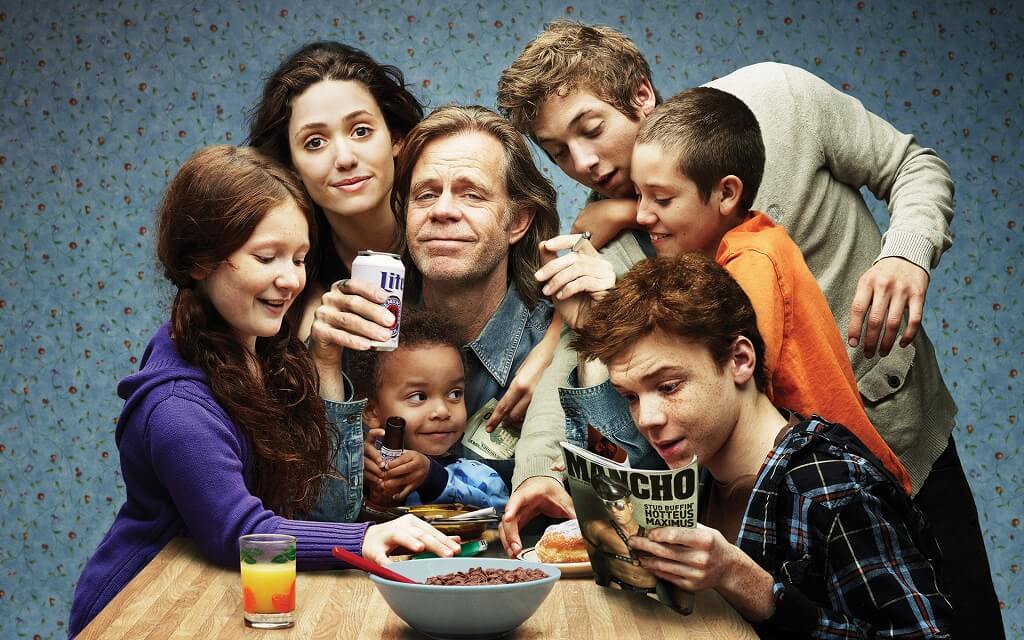
It seems almost everyone claims to be from a dysfunctional family. Sometimes, we blame our current problems on the family we grew up into the extent that we don't take responsibility for our actions. Some people are now growing up in a dysfunctional family or grew up in one in the past. How do you know whether family dysfunction is a serious problem for you? You can start exploring this issue by learning more about dysfunction in families and the effects of growing up in the turmoil of a family that doesn't work.
What Is a Dysfunctional Family?
A good way to begin your journey of self-discovery is to learn the definition. How is a dysfunctional family defined? If you were or are a part of a dysfunctional family, define it in your terms first. Because family problems that last for years come to seem normal, many people from dysfunctional families don't recognize what makes their family dysfunctional. They may know something is wrong, but what it is may seem unclear.
The Medical Dictionary of the Free Dictionary defines ' dysfunctional family' like this:
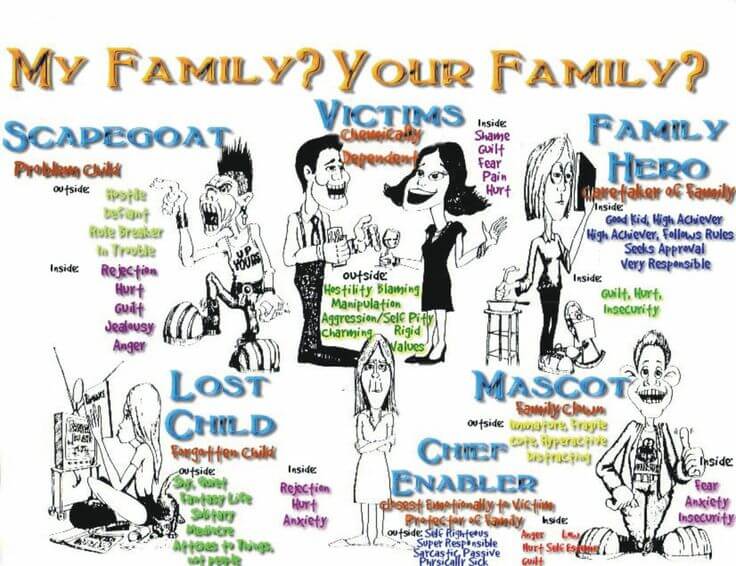
"A family with multiple 'internal' - e.g., sibling rivalries, parent-child - conflicts, domestic violence, mental illness, single parenthood, or 'external' - e.g., alcohol or drug abuse, extramarital affairs, gambling, unemployment - influences that affect the basic needs of the family unit."
The main things to remember about this definition are that there are multiple negative influences and that they affect basic needs. This is what separates families with minor dysfunction from those where family dysfunction is a serious problem.
Why Is There Severe Dysfunction in Some Families and Not in Others?
The specific reasons for significant family dysfunction are as numerous as the families that experience it. However, there are several categories of problems that can cause dysfunction.
Family History of Dysfunction
People tend to learn their parenting styles from their parents or other caregivers. If their parents abused them, they may abuse their children. Or, they may go overboard the other direction, being unnecessarily lenient. They may manipulate each other and their children as their parents did. They may not truly understand how to teach their children in healthy ways.
The good news for people who grew up in a dysfunctional family is that they can learn better ways of parenting. They can deal with the issues they still carry as adults and learn how to love, appreciate, respect, and deal with each other on a less emotional, erratic way. All they need is the willingness to do the work it takes to overcome those issues and find someone to teach them better.
Medical Problems
Physical illness in itself doesn't cause family dysfunction. However, it can make life much harder for everyone concerned. Parents sometimes rely on their children to do things they would ordinarily do for themselves, causing them intense anxiety and sometimes depression. If one child is ill, the other children may feel neglected as you focus all your energy on helping that one child.

You may not have had any control over the illness that puts such strain on your family, but you can control your actions, learn to use the resources available to you, and meet your children's needs. Medical problems present a tremendous challenge, but with the right help, you can keep your family functioning well.
Mental Illness
Biology plays a major role in many mental illnesses, but the behavior problems that are usually a part of psychological problems make family life much more challenging. People with untreated mental illness can cause discord in a family that would otherwise be highly functional. With treatment, people with mental illness can be great parents. They can contribute positively to their families as children.
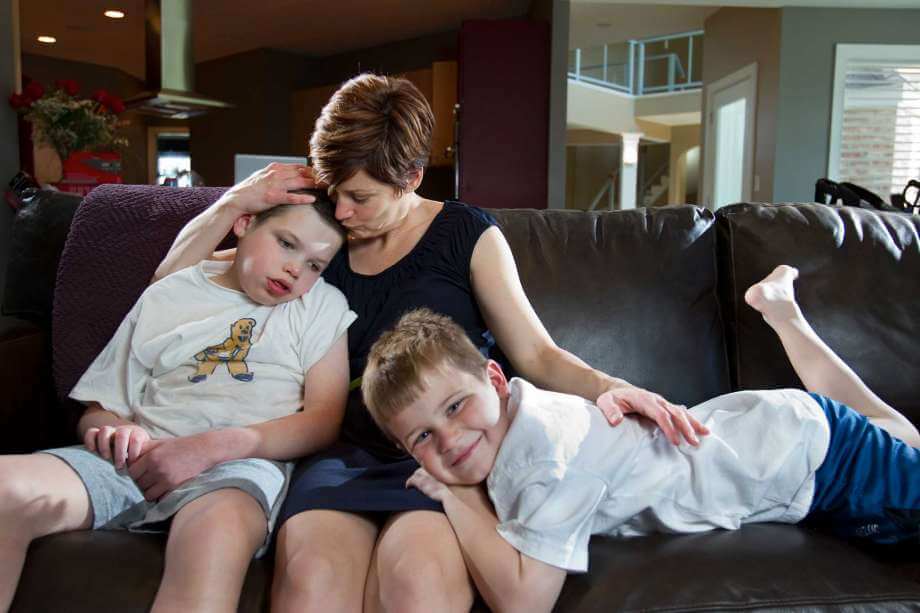
Addictions
Whether you or your child is addicted to drugs, alcohol, gambling, or anything else, the family suffers. Codependence can change the way you relate to each other, causing family members to focus on the addiction and the addict. When the addiction is severe enough, it can eat up all the family's financial and emotional resources. Mentally healthy people are extremely challenged when there's an addict in the family. Those who have even the slightest mental health issues tend to become sicker.
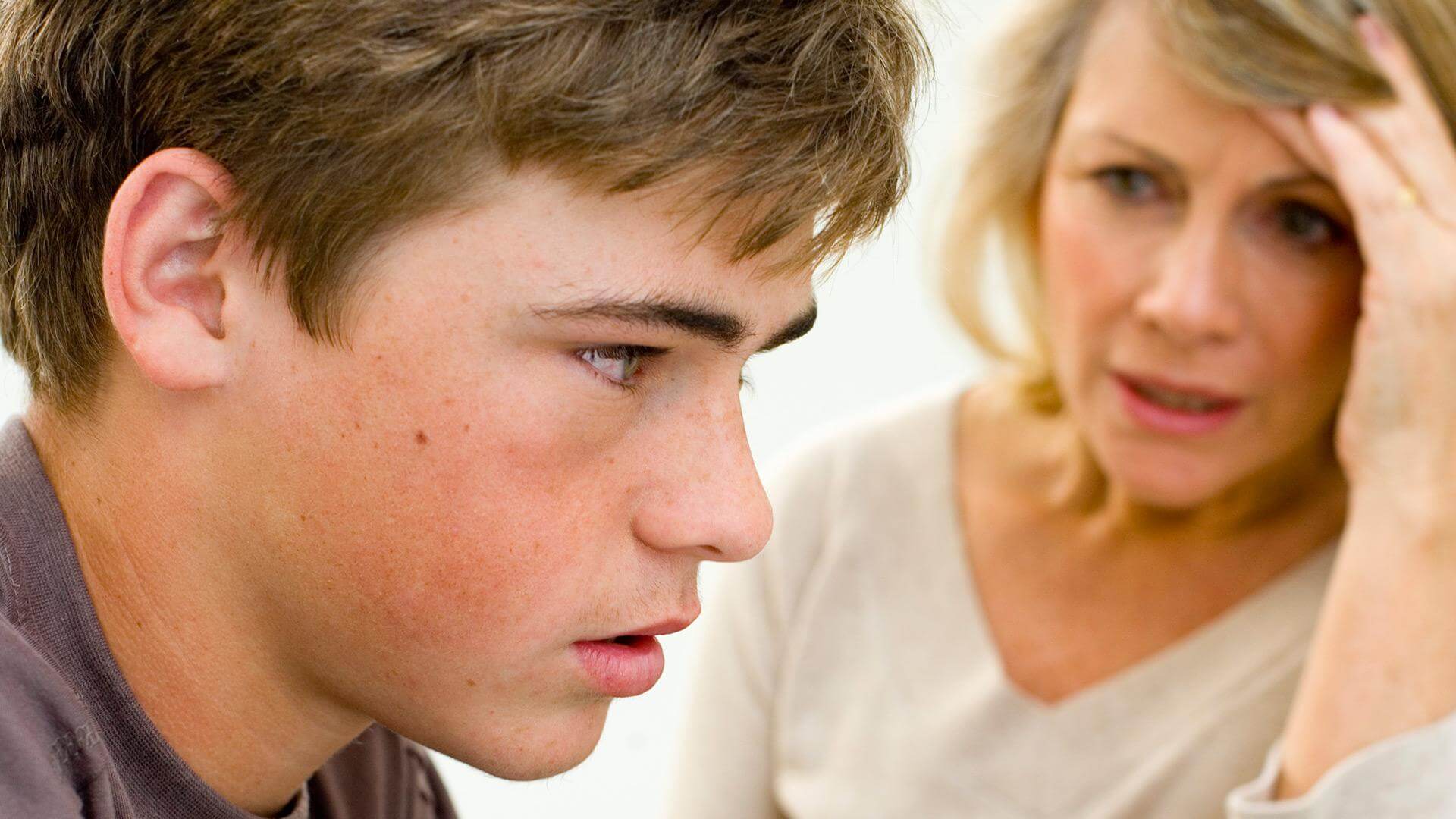
Life Situations
It's hard to have a life that doesn't include some stressors. In fact, psychologists know that a certain amount of stress can be healthy, pushing you to keep reaching for greater things in your life. However, when life's uncontrollable circumstances jeopardize your family's security and well-being, the stress can cause family members to lash out at each other in frustration. We all want to have a happy, peaceful life. The reality is that isn't always easy. With help, though, you can learn to deal with life stressors very well and learn and teach your children how to thrive in even the direst circumstances.
Dysfunctional Family Characteristics
So, what is it like to live in a dysfunctional family? Dysfunctional family characteristics can begin to tell the story of life in such a family.

Communication Problems
Poor communication may be the single most telling characteristic of a dysfunctional family. While other problems may abound, they could all be managed better with healthy communication. In a dysfunctional family, people don't listen to each other. Rather than talking directly to someone they have a problem with, they go to other family members to be heard without taking what can feel like the monumental risk of dealing with the problem directly. They become bitter, passive-aggressive, and distrustful, all due to their inability to communicate directly with each other.
Addictions
Addictions can be a contributing factor to family dysfunction, but they can also happen as a response to the dysfunction in the family. People don't know how to deal with the tension of living in a family that doesn't meet their needs. As a result, they may turn to addictions to feel better, if only for a moment.

Perfectionism
When a parent is a perfectionist, they put incredible pressure on the other parent and the children - not just to do their best, but to do the impossible. Perfectionism isn't a healthy response to family life. It is a constant source of negative emotions for everyone involved. It wrings the playfulness out of young children and makes it harder for them to learn. Their self-esteem suffers, and they feel incompetent, worthless, and inadequate.
Lack of Empathy
It would be a mistake to be approving of everything your child does. However, in a healthy family, corrections are directed at changing behavior rather than making the child feel bad about themselves. In a healthy family, parents love their children unconditionally even if they don't like their behavior. In fact, it's this unconditional love that helps them work with the child constructively. When parents show empathy for a child's challenges, they teach the child to care for others as well as themselves.

Excessive Attempts to Control
Dysfunctional families are often characterized by a parent's excessive need to control the children and even the other parent. If they had a more relaxed and accepting attitude, they could encourage their children to be the best version of who they are rather than manipulating them to live their lives only to appease their parent.
Lack of Privacy and Independence
Parents in dysfunctional families tend to mistrust their children so much that they constantly invade their privacy. Certainly, there may be times when a parent needs to know what's going on with their child so that they can respond appropriately. However, parents in a functional family find out through honest communication rather than room-raids and harsh interrogations.
Children in a dysfunctional family aren't given the opportunity to be who they want to be. They aren't allowed to make their own decisions, develop preferences that are different from their parents', or have friends their parents don't enjoy. They're expected to be just like their parents in every respect rather than developing their unique personalities.
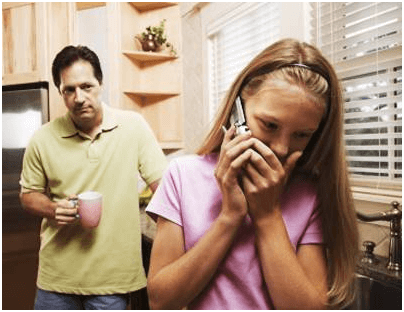
Constant Criticism
Criticism runs rampant in a dysfunctional family. Sometimes, the criticism is blatant, with parents picking on everything the child does, says, or is. Other times, it's subtler, as parents use sarcasm, teasing, or put-downs in a sneaky attempt to say something negative without making themselves look cruel.
Dysfunctional Family Roles
Decades ago, a psychologist identified several dysfunctional family roles associated with families of alcoholics. Not every dysfunctional family has an alcoholic member, but psychologists now recognize that these roles often appear in those other dysfunctional families, too. As you read the following list of roles, consider whether you identify with any of them.
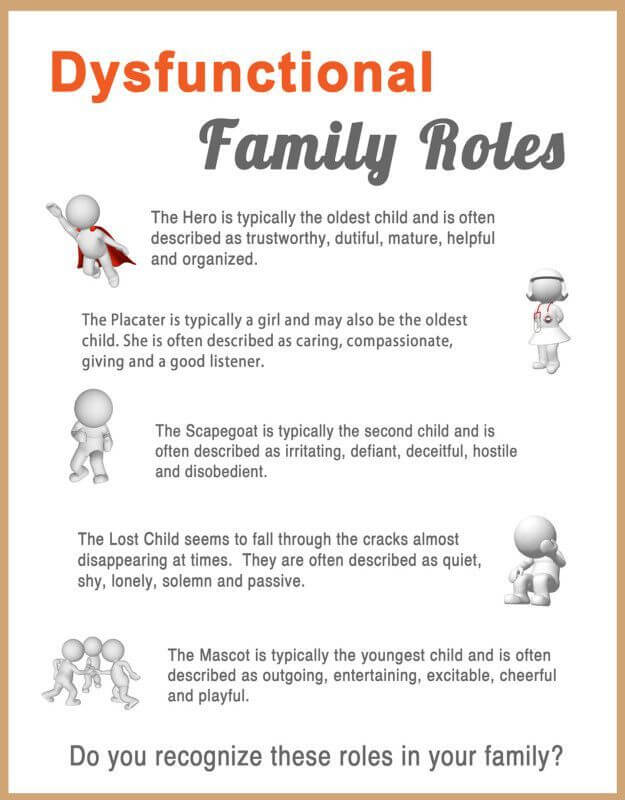
Your answer may reveal to you that you do need help learning to live differently.
Enabler or caretaker - tries to keep the family going despite the presence of addiction and other dysfunctions in the family. Protects problem of family members from others and the consequences of their behavior.
Scapegoat or trouble-maker - the family member who breaks the rules - not only society's rules but the rules laid down by their controlling parents. They become sick or weak, or they become angry and rebellious. Either way, their well-being is sacrificed to the needs of the family.
The lost child or the quiet one - the family who never gets in trouble but always keeps quiet and unobtrusive. They an unusual amount of time alone, avoiding their family and its dysfunctional ways. Usually has poorer social skills than others in the family, because they rarely practice interacting with others.
Mascot - the mascot of the family breaks the tension by bringing humor or mischief into the family's everyday life. They're the 'fun' one. They keep very busy lightening everyone's load but tend to suffer when things slow down.
The Hero - an intense desire to succeed in life may cause this family member to suffer from stress-related illnesses. They are typically very good at covering up the dysfunction in the family and making their parents look normal.
Immediate Effects of Living in a Dysfunctional Family

While a child is living in a dysfunctional family, they experience immediate effects of the situation. Some of these include:
Being socially isolated
Being withdrawn
Developing behavior disorders
Feeling lonely
Feeling cut off from their feelings
Being extremely self-critical
Having low self-esteem
Developing mental health issues such as anxiety or depression
Having difficulty expressing their thoughts and feelings
Lingering Effects of Having Lived in a Dysfunctional Family
When you live in a dysfunctional family as a child, your brain becomes wired to respond to family stress in unhealthy ways. It's a lot to overcome, but it is possible to rise above the negativity of a dysfunctional family as an adult. If you are going to do it, you'll need to learn how to heal from and manage the lingering effects of dysfunction, such as:
Self-criticism
Low self-confidence
Fear of situations others think of as ordinary
Addictions
Unhealthy relationships
Insecurity
Unhealthy parenting style
Poor communication skills
Emotional dependence on others
Mental disorders
What Is It Like to Grow Up in a Healthy Family?
If you focused on the dysfunctional family quotes, you see on the Internet, in the media, from the entertainment industry, and even in great literature, you might get the impression that there is no such thing as a healthy, functional family life. As an example of the myth of universal dysfunctional Family Circus, comic strips show a household in constant chaos. However, some families function very well, providing every member with what they need to live a peaceful and productive life.
So, what does a healthy family look like? Here are some of the characteristics that define it:
People communicate freely and openly, but compassionately as well.
Everyone's basic physical and emotional needs are met.
Family members hear each other out.
Conflicts are resolved directly rather than pushed out of sight.
Parents show unconditional love for each person, even when they don't approve of specific behaviors.
Family members work together to reach mutual goals.
Each person is allowed the personal freedom to develop their likes, interests, and unique personality.
Positivity becomes easier for all family members.
What Can You Do about a Dysfunctional Family You Were in As a Child?
To overcome a childhood marred by being in a dysfunctional family, you must start by healing those old wounds. Talking with a therapist allows you to express your feelings about what happened in a safe environment that's entirely focused on helping you become mentally healthier.
You can learn and practice the skills no one taught you when you were a child. These might include communications skills, independence, empathetic listening, and skills that make it possible for you to handle problems directly. You can learn to be more comfortable in your skin, with your mind, body, and emotions, and with your own choices. You can grow more self-confident, self-accepting, and more self-assured. You can learn to feel more trust and safety in your home environment.
You might ask, 'Yes, but how can I learn all those things at my age?' The way you learn is to read self-help books, write in a journal, and most helpful of all; you can talk to someone who has been trained to teach people how to overcome the destructive influence of a dysfunctional family.
How Counseling Can Help
Talking to a therapist is a very important part of recovering from the negative impacts of growing up in a dysfunctional family. A therapist understands the dysfunctional family on many levels. They know how to help you feel and understand the emotions that came from that. They help you see that you are a valuable person who deserves to be heard. They've learned and taught techniques for improving communication and problem-solving skills.
Family Counseling
Family counseling is most appropriate for people who are currently in a dysfunctional family, although it may be possible to have therapy with the members of your birth family after you are an adult. Typically, family therapy for a dysfunctional family involves each member of the family as they may be counseled individually, in small groups, or all family members together.
Some sessions might center on past hurts, unmet needs, or the damage they caused. Other sessions focus on what to do and how to create a more harmonious family in the here and now.
Individual Counseling
Individual counseling might be right for you, too, especially if the dysfunctional family situation is over. As an adult, you now have the power and resources to choose differently. You can decide to live a healthier, more peaceful life by learning how to overcome a past spent in a dysfunctional family.
If you want to start the process right now, you can go to BetterHelp.com. After answering a very brief questionnaire, Better Help offers recommendations of licensed counselors who may be best-suited to help you immediately so that you can connect with a qualified therapist and begin your journey of healing and self-care.

No comments:
Post a Comment